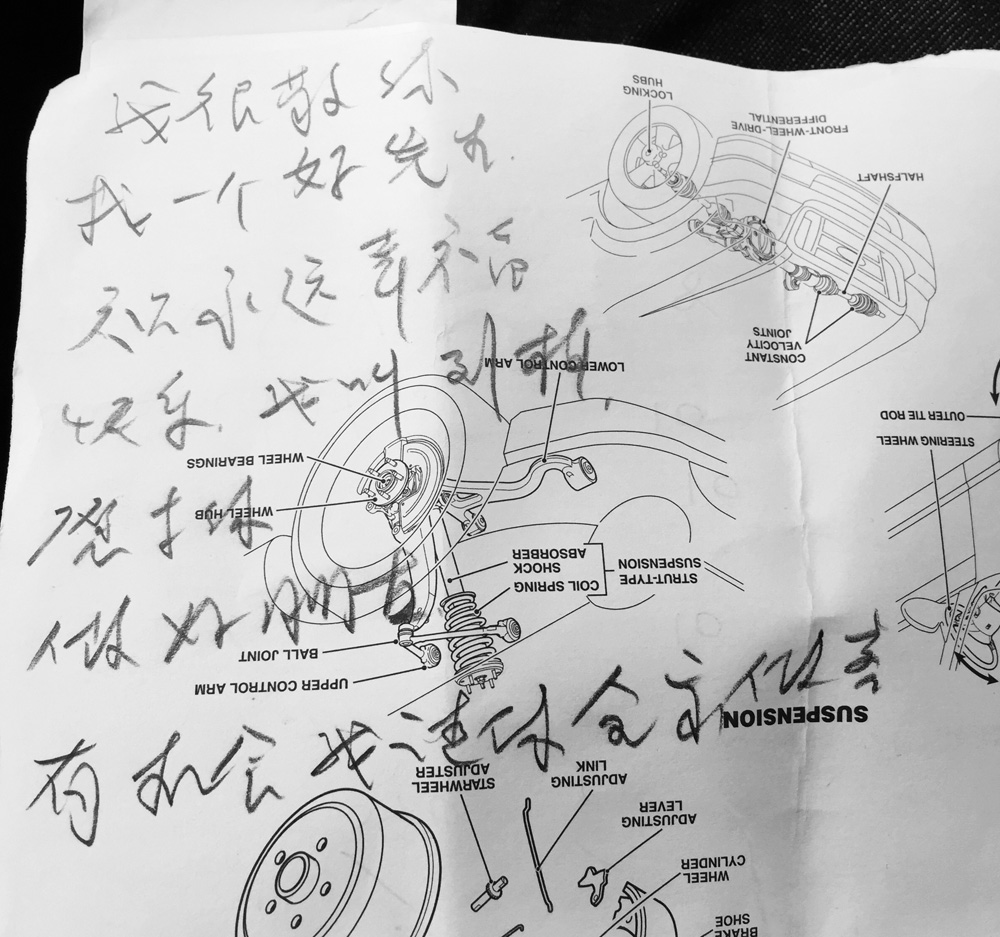Handwriting legibility
« previous post | next post »
Calvin Ho sent in the following photograph:
Calvin explains:
Here's the story: A friend of mine gave an elderly woman a ride during a heatwave. He did not speak Mandarin and she did not speak much English. All he could figure out from their conversation was that she was from Beijing. She scribbled this note before she left. My friend asked me to translate this, and I was at a loss.
As a heritage learner of Chinese who learned (traditional) characters later in life, I can't make heads or tails of this note, except for the 我很敬 in the first line, 我一个好 in the second line, and 有机会 on the last line. Then again, I have a lot of difficulty deciphering Chinese handwriting in general. I have an easier time with traditional characters, possibly because they're generally easier to disambiguate.
When I write, the characters look fairly close to a printed kaishu [VHM: "standard; regular"] font, since that's what I learned to model my handwriting after. I assume that that is how characters are taught to native speakers, as well, but as they write more extensively and more often in Chinese they eventually adopt more cursive forms.
Before I transcribe the note, I want to say that — although the writing looks fluid (not labored) — the language in several cases strikes me as rather odd (e.g., the first line, where people would normally say something like wǒ hěn zūnzhòng nǐ 我很尊重你 ("I respect you very much").
Here's the transcription of what's written on the note (the translation can only be approximate because the Chinese is not very good — or perhaps we can say that it is colloquial and informal, terse and somewhat abbreviated):
wǒ hěn jìng nǐ 我很敬你
("I respect you very much")
zhǎo yīgè hǎo xiānshēng 找一个好先生
("find a good teacher / doctor")
zhù yǒngyuǎn xìngfú 祝永远幸福
("[I] wish [you] happiness forever")
kuàilè wǒ jiào Liú Dòng 快乐 我叫刘栋
("joy I'm called Liu Dong")
yuàn yǔ nǐ 愿与你
("[I'm] willing with you")
zuò hǎo péngyǒu 做好朋友
("to be a good friend")
yǒu jīhuì wǒ qǐng nǐ quánjiā zuòkè 有机会我请你全家做客
("if I have the opportunity, I'll invite your whole family to be my guests")
Three or four of the characters (e.g., the surname) are a bit ambiguous, but this is roughly what the note says.
Hurried handwriting can be difficult to decipher in any language, my own chicken scratches not excepted.
[Thanks to Rebecca Shuang Fu, Jing Wen, and Fangyi Cheng]

JB said,
October 19, 2015 @ 6:53 pm
zhǎo yīgè hǎo xiānshēng 找一个好先生
Find a good husband???
Bathrobe said,
October 19, 2015 @ 7:20 pm
I think it just means "find a good person". 一个好先生 sounds better than saying 一个好人.
I think the third line runs on. It should be "I wish you happiness and joy forever".
Victor Mair said,
October 19, 2015 @ 7:31 pm
Of course, the third line runs on to the beginning of the fourth line, and the fifth line runs on to the sixth line. I was translating line by line for the convenience of readers who don't know Chinese.
John said,
October 20, 2015 @ 4:28 am
我很敬你 sounds downright ungrammatical to me. Maybe she was going for 我很尊敬你 and either couldn't produce the 尊 or glossed over it in a hurry?
shubert said,
October 20, 2015 @ 5:52 am
Most Chinese youngsters can not "decrypt" this scrawl.
Eidolon said,
October 20, 2015 @ 12:00 pm
The Chinese might not sound very standard/proficient because the writer herself does not know how to write as she speaks, else because the writer herself is not a native Mandarin speaker. Both would explain the omissions and word choices in the sentences.
Michael Watts said,
October 20, 2015 @ 12:54 pm
The last line — I would have interpreted it as "if you have the opportunity, I [hereby] invite …". But my Chinese isn't very good. Can someone confirm/disconfirm what was probably intended?
JS said,
October 20, 2015 @ 2:08 pm
Maybe just "when there's time"
shubert said,
October 20, 2015 @ 9:10 pm
Professor Mair:
Wish you could write a preface in revised edition for this book:
http://www.amazon.com/dp/0986078301
Mark Lo said,
October 20, 2015 @ 11:03 pm
Due to the subject matter of the paper it was written on, at first glance I thought the 幸 was a very messily written 车.
Michael Watts said,
October 21, 2015 @ 5:13 pm
JS, sure, but "when I have the opportunity, I will invite you" overtly makes the statement that that hasn't happened yet, and inquiring about it later would probably be rude (since the invitation still hasn't been extended).
shubert said,
October 22, 2015 @ 7:53 am
The hard part is her name. My mother had similar encounters but did not leave any hand writing, although neat calligraphy she can write.
JQ said,
October 22, 2015 @ 4:28 pm
@Michael Watts
You're overthinking it, it's just something you say, like "You must come and have dinner with us some time!"
As it doesn't appear that she left any contact details, I'm not sure that there ever will be a proper invitation
John Swindle said,
October 22, 2015 @ 9:16 pm
Look, look look for a friend.
I have found a very good friend!
Bowing, bowing, shaking hands,
Now you are my very good friend.
Good-bye!
–Chinese children's song